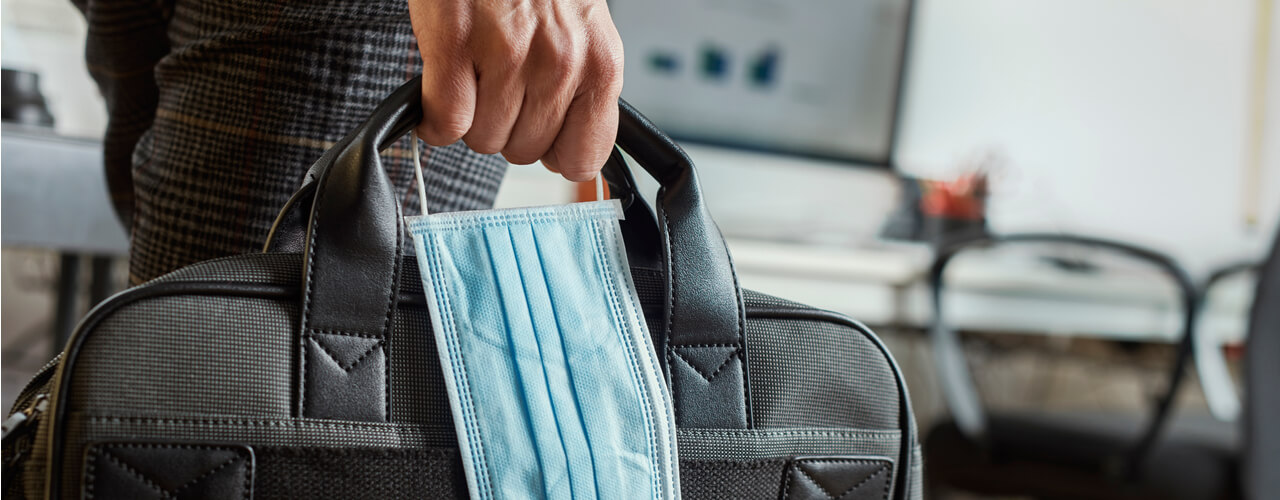As companies increasingly begin to reopen post-pandemic, most employees wonder what going back to the office might look like from now on. And, as workers question the new rules in place; what a normal working day will look like; whether the way we collaborate will change; and so on, we wondered how the news that companies were reopening their offices might affect employees’ mental health.
So, CommercialCafe sat down with several mental health specialists to determine:
- How employees who developed social phobia during the work-from-home era will approach the return-to-office policies
- How workers can find a work/life balance after experiencing so many shifts in how we work
- What the first steps should be as we transition back into working in the office
- How these shifts can affect our mental health
- What employees should expect from their employers
Read on for more insights.
Meet our Experts

Dr. Lindsay Israel
Chief Medical Officer at Success TMS

Dr. Bryan Bruno
Medical Director at Mid City TMS

Dr. Elena Welsh
Licensed Clinical Psychologist at Choosing Therapy

Dr. Bruce L. Thiessen
Licensed Clinical Psychologist at Dr. BLT Music

Dr.Glen Hong
Best-Selling Author, Clinical Psychologist and Professor

Aura Priscel
Clinical Psychologist, Mental Health Therapist and Contributor at Psychology Degree Guide

Marina Krugolets
Licensed Mental Health Counselor atEclectic Psychotherapy Group

Kimberly Perlin
Licensed Clinical Social Worker providing Psychotherapy at Kimberly Perlin.com
As companies are slowly starting to return to the office, what should be the first steps that workers take after working from home for so long?
Dr. Lindsay Israel
“Consider coming to your office early and set things up in a way that works for you now. This may have changed since you were working from home. You might need to reorganize your drawers or you might need to add or remove a file cabinet. Try to reacquaint yourself with your workspace prior to your first full day back in the office.”
Dr. Bryan Bruno
“With any life change, people should make time to check in with themselves. This practice applies to returning to the office, as well. Accept and note any fears, concerns or positives of going back to the office. Having a list will provide clarity if issues or anxieties arise later.”
Dr. Elena Welsh
“It can be helpful to take some time to mentally prepare to return to the office in the same way that you might if you were starting a new job. Take a moment and think through the details of your first day — like transportation, meals, etc. This will help reduce additional stress on the day you return to the office, which you don’t want to add on top of the first-day jitters. Recognizing that this is a big transition in the midst of a time that is filled with a lot of big transitions in all of our lives can also help encourage us to be kind to ourselves.”
Dr. Bruce Thiessen
“First, workers should lower their self-expectations. They should expect to feel some level of discomfort, and they should not expect to handle it perfectly. They should expect that they will need a period of adjustment.
Knowing these things, workers need to be prepared with go-to coping strategies tailored to their own specific personalities and preferences. For some, this may include listening to relaxing music or specific songs that take them back to a peaceful time in their lives prior to the pandemic. For others, it may involve stepping out of the office periodically to take a short walk and to take in a little bit of nature and all that it has to offer. For others, simply standing up, stretching, taking a few deep breaths, and expelling them slowly now and then may be sufficient. Reaching out and making time to communicate with fellow coworkers regarding any adjustment issues one may be having may also be a necessary step in successfully adapting to a return to the job site.”
Dr. Glen Hong
“I think the first thing that companies should do is to set up an open forum meeting for their employees and allow space for them to process. I would ask the employees the following four questions:
What has been your experience while working from home? What are the challenges that you are individually struggling with as you are coming back? What can we do as a company to help you in your transition back to the office? What are the current values that you have when it comes to work?”
Aura Priscel
“The first thing you’re going to need to do when getting ready to head back to the office is to get back into your morning routine. It’s going to be a big change from working from home! You’ll need to schedule in time before work to shower, have breakfast and commute — all habits that may have gotten a bit rusty while working remotely. Your mornings may very likely require more organization than you’ve become accustomed to, and you can ease the transition by starting to make some of those changes now.”
Marina Krugolets
“It’s important to be patient with yourself and give yourself time to adjust to returning to the office, just as learning to work from home required an adjustment period. Try to cultivate a ‘go with the flow’ attitude and be prepared to be adaptable as workplaces adapt to whatever changes COVID may have prompted. Remember, you are not going through this adjustment alone, and be sure to communicate and seek support from your coworkers and supervisor. Be sure to include daily self-care and stress management practices, such as physical activity, mediations, journaling, breathing exercises, yoga, and talking to supportive friends and family. If you started new healthy habits or routines during COVID, try to keep those going as you return to the office. Take time to plan out your clothes, meals and schedule the night before so you are well-prepared. Take things one step at a time.”
Kimberly Perlin
“If possible, offer half-days in [the] office or alternating work-from-home/work-in-the-office days. Employees need time to secure daycare [and] transition back into not being home all day. Be honest with your employees — if they were able to complete tasks from home efficiently, don’t try to convince them they are ‘needed’ at the office. They know the truth from lived experiences. If some employees struggled with their ability to complete tasks from home, tell them the concrete difference: ‘You were able to complete X amount of tasks in X time, and when you were at the office, you could complete X in X amount of hours.
Be aware of your own boundaries and expectations. Let’s say your employee was able to take your call at 8 p.m. during COVID because they flexed their hours due to a child’s school schedule. Don’t expect them — post-COVID with regular hours — to reply to an 8 p.m. email. If at-home work is your employee’s preference and all tasks are completed in a timely manner, let them work from home.”
How should people who have or developed social phobia or agoraphobia during the pandemic approach the return to office?
Dr. Lindsay Israel
“Take baby steps. Start venturing out of your house more before going all in to a full day of work at the office. Even if you have no place in particular to go, come up with a place — whether it is a park or a shopping mall. Practice being in larger spaces and with more people.”
Dr. Bryan Bruno
“Companies should communicate their COVID-19 protocol ahead of reentering the office. Even with protocols that follow CDC guidance, some may face anxiety when returning to the office. Communicate with Human Resources employees this generalized social phobia and agoraphobia to see if any accommodations can be made. List out your expectations and preferences so if any conversations do materialize, you can have consistent demands and explanations.”
Dr. Elena Welsh
“f you have developed fears around returning to the office, approach it in the same way you would approach any fear that is standing in the way of your goals and values. What tools have helped you face your fears in the past? Breathing techniques? Reminders that avoidance behaviors increase the fear response? Catching and shifting any thought patterns you may be engaging in that exacerbate fear — like exaggerating or catastrophizing? And, of course, reach out to self-help tools and personal and professional support as you need to.”
Dr. Bruce Thiessen
“It is possible that a number of people actually developed social phobia or agoraphobia during the course of the pandemic. However, a more likely scenario involves people that had pre-existing conditions — such as social phobia and/or agoraphobia — the symptoms of which exacerbated as a result of the pandemic and all that followed in its daunting path.
In either case, employers should allow such employees to reintroduce themselves to the office environment incrementally or in stages. It is in the best interest of both the employer and the anxiety-ridden employee for the employer to offer a schedule with built-in flexibility.
Of course, in most cases, psychotherapy will be necessary to make the prospect of returning to the office a realistic one.”
”
Dr. Glen Hong
“The first thing to do is to honor and understand that these feelings of anxiety are normal given what has taken place. They should honor their fear of being around people and leaving their house because it has been so long since they have done so. At the same time, it is learning how to diminish the anxiety as reintegration back to life begins. There is a saying in anxiety and that is, ‘What you resist will persist and what you embrace will erase.’ When it comes to the fear of socializing or leaving your house, plan in advance and give your mind and body permission to have anxiety. This will greatly reduce the worrying beforehand and help you relax when the event is happening. For example, if it is 7:30 a.m. and you need to leave the house at 8:15 a.m., plan on having an anxiety attack about leaving the house at 8:15 a.m. That way, you will worry less before and, when 8:15 a.m. comes, you will have very little anxiety symptoms.
Similarly, if you are anticipating anxiety about socializing again with coworkers while on the drive to work, plan on having an anxiety attack at 9 a.m. when you walk in. This way, the worrying will diminish before 9 a.m. and, when you do see your coworkers, your symptoms will be much less. This is known as a paradoxical directive, and it will naturally allow the body to stabilize itself over time. If the anxiety symptoms continue to persist even after these directives, please seek out a professional — either through your employee assistance program or through outside resources to assist.”
Aura Priscel
“If social phobia or agoraphobia are present, your return to the office should be gradual. Start slowly while you regain the confidence and comfort you once felt. Talk about your concerns with your manager or your HR office so they can help provide you with the support you need to return to the office and be a functional and productive worker.”
Marina Krugolets
“Pay attention to negative, distorted thoughts which contribute to your social phobia or anxiety and be prepared to challenge them and reframe them. Keeping a thought log can help with this process. Remember that thoughts are not facts. Repeatedly putting yourself in situations where you have opportunities to interact with others will help you increase your confidence in social situations. Develop a ‘toolbox’ of strategies you can use when you feel anxious, such as breathing exercises and progressive muscle relaxation. For example, try ‘square breathing’ (breathe in for four counts and hold for four counts; out for four counts and hold for four counts; and do this four times). If your feelings become difficult to manage, seek professional counseling”
Kimberly Perlin
“The only way to break a phobia is exposure therapy: Your brain has to have the experience of feeling the anxiety and nothing bad happening. Start commuting to your office, doing practice runs prior to going into the office to acclimate yourself to the drive. Expose yourself to more social situations so you can get accustomed to interacting in more social situations.”
What should employees expect from their employers during this transition?
Dr. Lindsay Israel
“It is reasonable for employees to be allowed to go to their offices ahead of time, even if the office isn’t officially open yet. Employees should be able to be safe and comfortable in their own work environment, which means that if you, as an employee, feel more comfortable wearing a mask at work even if the company policy does not require it or even encourage it, you should be able to without issue. You should expect that you will be paid on time as usual, COVID or not.”
Dr. Bryan Bruno
“Employees should expect proper communication and ongoing channels for immediate queries. In addition to platforms to speak up about office conditions and regulations, employers should respond to concerns in a timely manner.”
Dr. Elena Welsh
“Ideally, employers would recognize the emotional and logistical impact of this transition on their employees and offer additional wellness support and an incremental return plan — for example, slowly increase days in the office per week. I have noticed an increased demand for mental health providers, like myself, to come speak to employees in corporate environments in order to offer additional tools and support for coping with this upheaval on top of an undeniably stressful year. But, unfortunately, this will not be a universal response. I do think that employer flexibility and compassion will have a particularly strong impact on long-term employee satisfaction and retention in the current climate.”
Dr. Bruce Thiessen
“Employees should expect some effort on the part of employers to be flexible and to exercise patience. Additionally, employees should also expect employers to support them through the process, to provide training, and to offer expressions of reassurance and encouragement.
On the other hand, it is also important for employees to realize that employers have a business to run, and they have a right to expect employees to meet them halfway. Like a great athletic coach, a great employer will go the extra mile in fostering an environment in which employees feel empowered and motivated to do their best, especially under difficult circumstances.”
Dr. Glen Hong
“I think employees should expect that there is a grace period of adjustment needed and that life cannot just go back to normal as soon as everyone comes back. This critical period of adjustment will require a greater sensitivity on the part of the employer. Simply put, reintegrating back to a post-pandemic world is going to be challenging, and the employees need the time and space to reintegrate at a pace that is supportive and understanding.”
Aura Priscel
“Employees should expect emotional and psychological support and understanding from their employers. Most employers understand that workers are human beings and that not everyone reacts in the same way to traumatic or stressful situations. Like you, your manager has also endured the lockdown and may have experienced the loss of family and friends, as well as the strain on mental health. So, chances are good they will be empathetic to your needs.”
Marina Krugolets
“Employers should be patient with their employees as they work to adjust to being back in the office and the changes in the workplace which COVID has prompted. Create a work environment which is a safe space for employees to talk about their concerns and reactions and get any needed support from each other and their supervisors. Keep employees informed of any changes and be transparent about what you don’t know or are still figuring out. Be open to hearing their feedback, concerns and suggestions. Be on the lookout for employees who may be struggling and help them connect with any needed resources”
Kimberly Perlin
“That many may be sad or even mourning the loss of freedom they had working from home. Try to not personalize this response and be as flexible as is functional for the company.”
How do you think these changes (working from home versus working from the office) could affect a person’s mental health?
Dr. Lindsay Israel
“A person who opts to work from home because it is simply ‘easier’ — rather than deal with traffic or deal with that chatty coworker who sits right next to you — might find the downside is that they lose the reason to get dressed every morning or shower or maintain a healthy diet. If you do not have a schedule you need to stick to, then you lose the drive to schedule time in your day for something like exercise. All of these changes that may initially seem like an advantage can become a disadvantage to your mental health. On the other hand, a person who opts to work from the office might find themselves missing certain opportunities that they had when they worked from home. Picking your kids up from the bus stop rather than them walking home as latchkey kids — or ordering delivery from your local favorite restaurant for lunch rather than eating in the office building basic cafeteria — might leave you feeling a little disappointed or even a little guilty, which can affect your mental health.”
Dr. Bryan Bruno
“At the beginning of the pandemic, working from home created excessive isolation. Isolation correlates with certain depressive states. Now, working from the office could benefit those feeling isolated or stir up social anxieties. Some preferred the time alone with family. Returning to the office may stress some out more than working from home did. Commuting into work requires more time and money, so the busier schedule of working from the office may overwhelm some, as well”
Dr. Elena Welsh
“Changes in work-from-home versus work-from-office policies affect people very differently depending on their personalities, lifestyles and preferences. I have clients who have now decided that working from home is one of their top workplace priorities based on their experiences in the past year. But, I also have clients who can’t wait to get back in the office because they feel isolated and are looking forward to socializing and interacting with colleagues in person. However, if someone’s working style and preference is mismatched or misaligned with their working environment, this can impact their mental health in the long-run. There is a lot of value in finding the right fit for you, in terms of both the content of your work and the environment you are working in.”
Dr. Bruce Thiessen
“Employees will likely suffer an adjustment disorder, which could involve overwhelming states of anxiety, insomnia and, in some cases, depression — which often includes, among many other symptoms, anhedonia (a state in which there is a diminished level of motivation to engage in activities that were once experienced as interesting and or pleasurable).
Anhedonia, left untreated, could definitely impact one’s level of productivity and the quality of one’s work. So, addressing the symptom in therapy is essential for a return to the office to be a viable option.
Depending on how directly individual employees may have been impacted by the pandemic, some may actually have developed symptoms of PTSD [post-traumatic stress disorder], which requires intensive psychotherapy. Some cases of PTSD may be so severe that it may be impossible for an employee to return to the office. Even working from home with such a condition can be an arduous challenge at best. But, treatment offers hope for the individual to be restored to a level of functioning sufficient for working from home and, in some cases, for a return to the office.”
Dr. Glen Hong
“I feel that it can have a significant impact. The truth is every individual’s level of coping is different and that nuance needs to be understood. In the bigger picture, this pandemic forced us all to reevaluate every area of our lives, including work. A discussion with employees would be beneficial about previous work schedules and feasibility, while at the same time dialoguing about possible creative alternatives that can take place. By doing this, this can greatly improve overall morale and wellbeing, as well as improving the overall delivery of services.”
Aura Priscel
“It can depend on the organizational climate where someone works. If it’s not a healthy work environment, then working from home may have felt like an escape from a bad situation, and having to return to the workplace may create a lot of stress and anxiety.
Commutes are also a factor. Many of us find them tedious and difficult, and the prospect of returning to long stretches on the road or in the car twice a day may be unappealing at best, and positively dread-inducing at worst.”
Marina Krugolets
“For some people, working from home was isolating and deprived them of a sense of being part of a team, and returning to the office can provide much-needed social interaction. But, returning to the office can also add commuting time and more time spent away from family members, which can cause stress. Uncertainty about COVID variants and other risks associated with the pandemic can make a return to the office anxiety-provoking.”
Kimberly Perlin
“COVID, overall, has caused many problems in the mental health world — our anxiety and social isolation has increased. The transition will take time.”
What do you expect to be the main changes in how we interact in a post-pandemic world?
Dr. Lindsay Israel
“I expect, with a little time, we will go back to the way it was, for the most part. We are social creatures — pandemic or not — and most humans have an innate drive to be with other humans in some manner. For those who [are] more introverted and content to be mostly on their own, the work-from-home job opportunities will offer those people a comfortable place in the world — rather than feeling like they have to fit into a mold or be forced to work in an environment where they can’t thrive.”
Dr. Bryan Bruno
“Post-pandemic, people should evaluate their priorities and make sure they seize life. Though it may sound cliche, some already have begun this process. As the world returns to a semi-normal state, more will realize [that] the habits and patterns of life are restarting, and ensuring you enjoy those will be a top priority.”
Dr. Elena Welsh
“I am hoping to see increased flexibility in the workplace, as well as an increased focus on mental health and wellness. The way we work in the United States is, in many ways, unsustainable when contrasted with models of work in different countries. The pandemic brought to light the many ways our work lives do not make room for family or mental and physical wellness.”
Dr. Bruce Thiessen
“A complete return to normalcy may be an unrealistic expectation, but it is realistic to expect a return to near normalcy — at least in many spheres of our existence, including the workplace. If our leaders are infused with optimism, they can — with the help of employees — make the workplace a better place than it ever has been before.
“There will be other crises, other challenges and other daunting events which threaten to impact the mental health of employees. In fact, many of these challenges have already emerged. As the song goes — or a slight paraphrase goes — ‘We get knocked down, but we get up again. Are you ever gonna keep us down?!!’”
Dr. Glen Hong
“I think the main change is the awareness and understanding that all public settings and events will be seen through the lens of health and safety. We often took for granted how freely and easily we interacted with each other pre-pandemic and now, moving forward, there will be a natural hesitancy and regard for safety in everything we do.”
Aura Priscel
“Communication through videoconferencing will continue to be much more prevalent than it was prior to the pandemic. Companies have seen how effective these platforms can be, and virtually every office worker is an expert at them now. Even as more and more of us return to the office, we can expect Zoom to be a bigger part of our life than it was pre-pandemic. Social distancing, staggered shifts, masks and ubiquitous hand sanitizer are also likely to be part of office culture for some time. It’s going to take some adjustment to get used to this new normal.”
Marina Krugolets
“For many people, COVID has resulted in decreased social interaction and more cautiousness in our dealings with others. We may find ourselves more suspicious of others, wondering if they are taking appropriate health precautions or feeling defensive about other people questioning our own precautions. Interaction with others has become more complicated and less spontaneous. In some instances, people have realized they can do without certain kinds of social interactions [that] they used to consider a regular part of their lives. There is also an increased tendency by some people to prioritize certain relationships and weed out others.”
Kimberly Perlin
“People have been able to question their normal way of life during the pandemic. Many may choose to change location, jobs and lifestyles from their pre-pandemic life.”
How should people seek work/life balance after another shift in how they do their jobs?
Dr. Lindsay Israel
“A work/life balance is necessary no matter the scenario. Listen to your body. It will tell you when it is being pushed too far. If [you] find yourself having more headaches, backaches, muscle tension, irritability, tearful moments — then your body is reacting to being under stress. Make sure to incorporate breaks in your workday and try to go home on time. Don’t pull ‘all-nighters’ in the office or your house. Know when to say when and start up fresh on a new day. If you work from home, make sure to change your environment from time to time so that you are not looking at the same four walls all day. Get up and get out — whether that means for 30 minutes or for three days on a vacation. It is important to stay ahead of stress or a misbalance, rather than push yourself to the brink.”
Dr. Elena Welsh
“Identify your personal non-negotiables and hold those boundaries, whether that is no work on the weekend or no calls after 7 p.m. Additionally, regardless of if you are working from home or in the office, it can be helpful to create small rituals to denote ending your workday. For example, if you are working from home, you might end your day by writing the next day’s to-do list, closing your laptop, and then shifting the mood in your atmosphere by lighting a candle or turning on some music. If you are working from the office, your commute offers a natural transition period. But, you may still want to be mindful of leaving the work-related mental to-do lists at the office.”
Dr. Glen Hong
“I think it is understanding and honoring where work fits into their lives at this point — and making decisions from that space. This has truly been a transformative event, and the biggest mistake would be trying to go back and live like nothing has happened. We must all mourn and process how we used to live; honor where we are and the current values that we hold; and make value-based decisions that will drive our future.”
Aura Priscel
“Employees should focus on achieving a lifestyle where they can work in a healthy way, while still having time to rest and be with their families. The pandemic has taught us how important it is to prioritize family, friendships, and mental health, and we shouldn’t lose sight of that when we return to the office.”
Marina Krugolets
“When many employees were forced to work from home, they found a kind of work/life balance pushed on them as they did their jobs and took care of their kids in the same place, all at the same time. This reality forced many employers to accept that their employees can’t always devote 100% of their time and energy for 14-hour days. Ideally, even as the pandemic has slowed down, employees can continue this mindset and make room in their day for family, learning, leisure and self-care. To maintain work/life balance, try to edit your daily to-do list. Identify those essential tasks which need to get done today and also those which can wait until a later time. View taking regular breaks and spending time on leisure and self-care as essential. You can’t drink from an empty cup.”
Kimberly Perlin
“Give themselves time to adjust with lower expectations during free time. Give up the idea of getting back to pre-COVID life. Consider what kind of life you want now and implement a plan to make it happen.”
If you found this article useful and informative, please feel free to check out our Expert Insights & Roundup Series.



